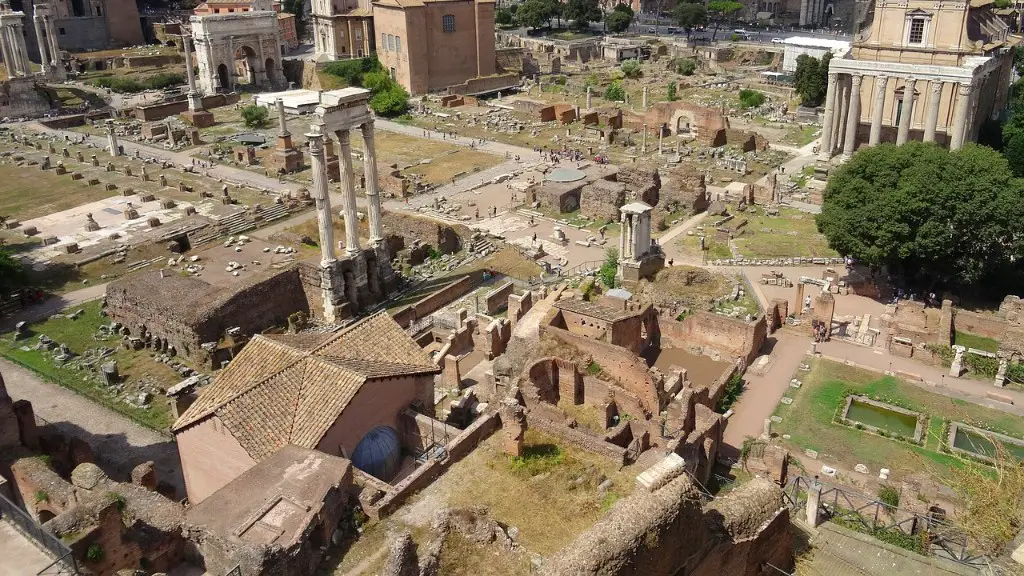August Senate Reign
Augustus is known as the first Roman Emperor and was given the title Augustus by the Senate. He came to power after the death of Julius Caesar and made a number of significant changes and reforms to the Roman Republic. His reign is marked by the Pax Romana, the Roman Peace that lasted for over two hundred years, and his many contributions to the culture and religious life of Rome. He died in 14 A.D. in the city of Rome.
Augustus’ rise to power was the result of the Civil War that occurred in the wake of Julius Caesar’s death in 44 B.C. After the murder of Julius Caesar, the Roman Republic descended into chaos and many powerful Roman generals, including Mark Antony and Octavian, battled it out for control of the Republic. Octavian, who would later take the name Augustus, ultimately won the civil war and assumed the title of Emperor.
When Augustus came to power, he restored order in the city and ordered that many of the Republic’s laws be rewritten to suit his vision of a stronger, unified Rome. He also established many civil and military reforms, including the expansion of the Roman Empire, the establishment of a professional civil service, and the formation of a cohesive and unified Roman political system. He made sure that the Roman Senate remained a powerful governing body and even went so far as to reorganize it to make it more efficient and powerful.
Under Augustus’ leadership, the Roman Empire was strong and prosperous. He was an extremely popular ruler, known for his religious tolerance, generous salary offerings to his people, and focus on cultural advancement. During his reign, the Romans built many structures and monuments, including the Colosseum in Rome, and celebrated many of their holidays and festivals, such as Saturnalia and the Ludi Romani. Augustus also enacted a series of reforms to Roman religion, allowing the worship of many different gods and goddesses.
Augustus was well-loved by his people for his ability to restore much-needed stability after the tumultuous period of the civil wars. He was greatly respected by the Roman Senate and was considered one of the most capable emperors in the history of Rome.
Augustus’ Death
Augustus passed away on August 19th, 14 A.D., at the age of 76. After a long rule, he died peacefully in his home while surrounded by friends and family. His death was greeted with sadness by the people of Rome, who had grown to love him as their emperor. However, Augustus was able to ensure that his legacy would be remembered with various monuments and public works.
On the day of Augustus’ death, the Senate declared him a “Divus,” the Roman equivalent of a god. The Senate also gave him the title of Princeps, or “First Citizen,” in recognition of his service to the Roman people. As Augustus was deified, his old rank of emperor was made into the title of Emperor of the Roman Empire and would be held by his successors. This title was later passed down by Roman emperors for centuries to come.
Augustus was soon buried on the grounds of his family estate, Mausoleum Augustus. The mausoleum contained many of Augustus’ personal effects, including his armor and a list of his accomplishments as emperor. The funeral was attended by many of his close friends and family and is remembered even to this day.
Legacy of Augustus
Augustus is remembered as one of the most influential emperors in Roman history. He helped to bring order to the Roman Republic and fought for the rights of the people. By the time of his death, Augustus had become a beloved figure in Rome and is still celebrated today.
Augustus’ reforms turned Rome into a military and cultural force and his administration was credited with bringing peace and stability to the Roman Empire. His reign ushered in an era of prosperity and stability that lasted for centuries and was known as the Pax Romana. Augustus’ reign is also remembered for its religious reforms and its advancements in education, art, and architecture.
Augustus’ legacy is one of a capable and effective leader who brought peace and stability to a war-torn Roman Republic. His reforms and efforts to improve the lives of his people have made him one of the most influential leaders of all time. Augustus will be remembered as a great leader who helped to unify Rome under a single, powerful ruler.
Memorial and Testimony of Augustus
Augustus was remembered by the Roman people long after his death in 14 A.D. Many public buildings, monuments, and temples were erected in his honor and his mausoleum remains a symbol of Roman greatness. Throughout the centuries, his accomplishments were taught in schools and he was celebrated in poetry, art, and music.
One of the most famous memorials to Augustus is the Ara Pacis. This monument was commissioned by Augustus’ son, Tiberius, and dedicated to Augustus in 13 A.D. It is located in Rome and contains portraits and reliefs that commemorate Augustus’ military campaigns and his achievements as emperor. It is still visited by tourists to this day.
Another testament to Augustus is the Res Gestae Divi Augusti (“the deeds of the divine Augustus”). This is a thirteen-chapter, Latin-language autobiography written by Augustus for posterity. It is an important source of information about Augustus’ life and rule and it was chiseled onto several marble columns in Rome and around the Mediterranean.
Successors of Augustus
Augustus’ legacy lived on through the Roman emperors who followed him. He created a dynastic succession that continued for centuries and is still celebrated today. His successors continued his tradition of expanding the Roman Empire and furthering the Pax Romana.
The first of Augustus’ successors, Tiberius, succeeded Augustus in 14 A.D. He proved to be a capable ruler, maintaining the provinces that Augustus had conquered and expanding Roman influence in the eastern Mediterranean. Other emperors such as Nero, Caligula, and Domitian followed, continuing Augustus’ legacy of strong and capable leadership.
The last of Augustus’ successors was Constantine I, who was crowned emperor in 324 A.D. He is remembered for his reforms to the Roman political system and for the conversion of the Roman Empire to Christianity. His progeny, the Byzantine Empire, lived on for centuries and finally ended in 1453 A.D.
Impatibility of Augustus
Augustus’ memory lives on in Roman history as the first and one of the most capable of the Roman emperors. He was beloved by the Roman people, respected by the Senate, and revered by his successors. Even today, monuments and public works remain standing as a testament to the legacy of Augustus Caesar.
Augustus’ legacy is unique even among the great Roman emperors. He is remembered as a brilliant strategist, as a great leader, and as a man who shaped the Roman world for generations to come. His vast accomplishments as an emperor, including his religious reforms, military conquests, and social reforms made it possible for the Roman Empire to flourish and prosper until its very end.
Assessment of Augustus
Augustus was a man of greatness who deserves to be remembered with reverence and admiration. His rule brought stability and prosperity to Rome and he is remembered even in modern times. He was a leader who understood the needs of his people and managed to put his vision of a strong and unified Rome into action.
As a leader, Augustus was a shrewd strategist, a talented administrator, and a respected diplomat. He forged alliances, conquered territories, and granted privileges to his people. He also created a unified administration and modernized the roads, the legal system, and the taxation system. His reforms and innovations, as well as his military conquests and religious reforms, laid the foundations for the Roman Empire and its lasting legacy.
Analysis of Augustus
Augustus is remembered as a powerful, ambitious, and passionate leader who left a lasting legacy. He was able to unite the Roman Republic and ushered in a period of prosperity and stability. His peaceful reign is known as the Pax Romana, and his accomplishments as leader have made him one of the most beloved and respected figures in Roman history.
As a leader, Augustus was viewed as a visionary and a brilliant strategist. He laid out a set of reforms that allowed the Roman Empire to thrive for centuries and managed to create a unified administration, a strong military, and a stable economy. He was a religious leader, allowing the worship of many different gods and goddesses, and a capable general, leading several successful military campaigns.
Augustus’ legacy continues to be celebrated today. His name and image can be found on numerous monuments and public works and is seen as a symbol of strong and capable leadership. He is revered and respected by historians and his memory lives on in Rome and around the world. Augustus is remembered as the first Roman emperor and will continue to be remembered for centuries to come.

